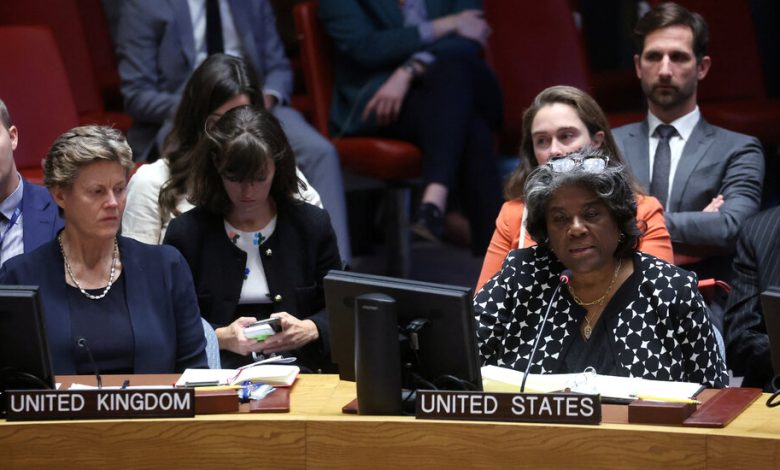The U.S. vetoes a Security Council resolution on the Israel-Hamas conflict.

The United Nations Security Council displayed deep divisions on Wednesday when it failed to pass a resolution on the Israel-Hamas war as the humanitarian situation in Gaza deteriorated and the conflict risked spreading to the region.
The resolution had the support of the majority of the Council members and had been expected to be adopted. The U.S. veto generated criticism of American double standards and accusations that the United States, which had criticized Russia for paralyzing the Council on the war in Ukraine, was impeding the work of the Council. But the American ambassador said the U.S. couldn’t support the resolution without a mention of Israel’s right to self-defense.
Brazil, which holds the rotating presidency of the Council this month, had put forth the resolution, which called for humanitarian access and protection of civilians in Gaza, the immediate release of Israeli hostages and condemned Hamas’s terrorist attack on Israel.
The ambassador from the United Arab Emirates, Lana Zaki Nusseibeh, said the resolution may not have been perfect but that it clearly stated “basic principles” that the Council “is obliged to reinforce and uphold.”
Brazil’s ambassador, Sérgio França Danese, said the resolution’s failure was “very sad” and that silence and inaction from the Council did not serve anyone’s interests, especially Palestinians in Gaza, who, she said, “cannot wait any longer.”
The United States was the only no vote, but as the holder of a permanent seat on the Council, its vote carried veto power. Two other permanent members, Russia and Britain, abstained, and the two others — France and China — joined with the remaining 10 Council members, including the United Arab Emirates, in voting for passage.
A day earlier, a resolution from Russia on the war that condemned violence against civilians but did not mention Hamas failed to garner the nine required votes.
Linda Thomas-Greenfield, the ambassador from the United States, said that the latest resolution, which would have been legally binding, could hamper President Biden’s diplomatic efforts. She was speaking on the eve of his whirlwind visit to Israel. To the Council, she said that the United States “is disappointed this resolution made no mention of Israel’s right of self-defense.”
The Security Council has struggled to respond to Hamas’s terrorist attacks on Israel on Oct. 7, which killed more than 1,400 people and left nearly 200 others as hostages. Israel has replied with retaliatory strikes on Gaza, killing more than 3,000 Palestinians and injuring more than 9,000, including nearly 1,000 children, according to the U.N.
The Israeli ambassador, Gilad Erdan, and the Palestinian representative at the U.N., Riyad Mansour, both said the Council had failed them.
Mr. Erdan said he was unable to fathom how the Council could fail to collectively condemn Hamas’s terrorist attacks. “Calling for calm, restraint and cease-fire is like putting a Band-Aid on a bullet wound,” he said. “Such steps would not eradicate the cancer that is Hamas.”
Mr. Mansour called on the Council to demand an immediate cease-fire. “The Security Council of the United Nations is unable to say the one thing that truly matters: stop the bloodshed,” he said.
The U.N.’s special coordinator for the Israel-Palestine peace process said the organization was engaging with all sides to open a humanitarian channel from the Rafah border in Egypt where convoys carrying aid have lined up.
“I fear that we are at the brink of a deep and dangerous abyss that could change the trajectory of the Israeli-Palestinian conflict, if not of the Middle East as a whole,” said the official, Tor Wennesland.
